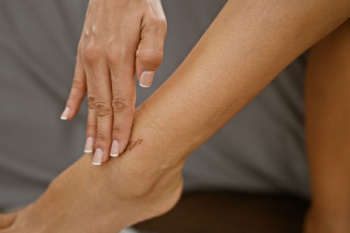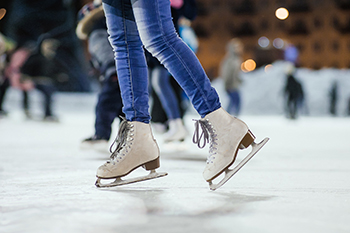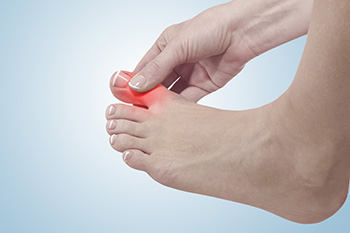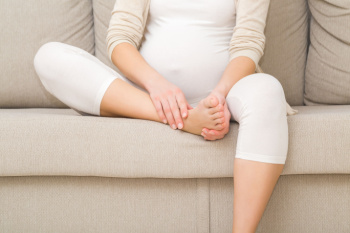February 2025
The Perils of Occupational Footwear on Foot Health and Wound Risk

Wearing the wrong occupational footwear can lead to serious foot problems, including the risk of developing foot wounds. Ill-fitting shoes can create excessive pressure and friction, which can in turn cause painful calluses and blisters. When left untreated, these minor injuries can progress into open wounds, increasing the risk of infection. Tight footwear or poorly designed toe boxes may damage the nails, leading to bruising, thickening, or fungal infections that make the surrounding skin more vulnerable to injury. Long hours on hard surfaces in unsupportive shoes can result in plantar fasciitis, while improper cushioning and poor arch support contribute to chronic foot and ankle pain. Over time, poor circulation, especially in individuals with diabetes, can lead to ulcers and slow-healing wounds. Workers should ensure they wear well-fitted, supportive shoes to prevent foot injuries. If wounds or persistent pain develop, it is suggested that you consult a podiatrist for a proper evaluation and more appropriate footwear recommendations.
Wound care is an important part in dealing with diabetes. If you have diabetes and a foot wound or would like more information about wound care for diabetics, consult with Dr. Steven Schwartz from Pennsylvania. Our doctor will assess your condition and provide you with quality foot and ankle treatment.
What Is Wound Care?
Wound care is the practice of taking proper care of a wound. This can range from the smallest to the largest of wounds. While everyone can benefit from proper wound care, it is much more important for diabetics. Diabetics often suffer from poor blood circulation which causes wounds to heal much slower than they would in a non-diabetic.
What Is the Importance of Wound Care?
While it may not seem apparent with small ulcers on the foot, for diabetics, any size ulcer can become infected. Diabetics often also suffer from neuropathy, or nerve loss. This means they might not even feel when they have an ulcer on their foot. If the wound becomes severely infected, amputation may be necessary. Therefore, it is of the upmost importance to properly care for any and all foot wounds.
How to Care for Wounds
The best way to care for foot wounds is to prevent them. For diabetics, this means daily inspections of the feet for any signs of abnormalities or ulcers. It is also recommended to see a podiatrist several times a year for a foot inspection. If you do have an ulcer, run the wound under water to clear dirt from the wound; then apply antibiotic ointment to the wound and cover with a bandage. Bandages should be changed daily and keeping pressure off the wound is smart. It is advised to see a podiatrist, who can keep an eye on it.
If you have any questions, please feel free to contact our offices located in Chambersburg, and Mcconnellsburg, PA . We offer the newest diagnostic and treatment technologies for all your foot care needs.
Foot Pain While Ice Skating

Feet can hurt while ice skating for several reasons, with the most common being improper fitting skates. If the skates are too tight or too loose, they can cause discomfort and pain by pressing on certain areas of the foot or not providing enough support. Poorly fitted skates may lead to blisters, pinched nerves, or restricted circulation, making skating a painful experience. Another factor is the lack of cushioning or support within the skate itself. Ice skating places a lot of pressure on the feet, especially during sharp turns or jumps. Inadequate arch support or lack of padding can result in soreness or fatigue. Additionally, the stiff structure of ice skates can sometimes cause muscles and tendons in the feet to tense up, leading to discomfort. Overuse or skating for long periods without taking breaks can also contribute to foot pain. If you enjoy ice skating and have foot pain, it is suggested that you contact a podiatrist who can offer effective relief methods, in addition to tips on how to protect your feet while skating.
Ankle and foot injuries are common among athletes and in many sports. They can be caused by several problems and may be potentially serious. If you are feeling pain or think you were injured in a sporting event or when exercising, consult with Dr. Steven Schwartz from Pennsylvania. Our doctor will assess your condition and provide you with quality foot and ankle treatment.
Common Injuries
The most common injuries that occur in sporting activities include:
- Achilles Tendonitis
- Achilles Tendon Rupture
- Ankle Sprains
- Broken Foot
- Plantar Fasciitis
- Stress Fractures
- Turf Toe
Symptoms
Symptoms vary depending upon the injury and in some cases, there may be no symptoms at all. However, in most cases, some form of symptom is experienced. Pain, aching, burning, bruising, tenderness, tightness or stiffness, sensation loss, difficulty moving, and swelling are the most common symptoms.
Treatment
Just as symptoms vary depending upon the injury, so do treatment options. A common treatment method is known as the RICE method. This method involves rest, applying ice, compression and elevating the afflicted foot or ankle. If the injury appears to be more serious, surgery might be required, such as arthroscopic or reconstructive surgery. Lastly, rehabilitation or therapy might be needed to gain full functionality in the afflicted area. Any discomfort experienced by an athlete must be evaluated by a licensed, reputable medical professional.
If you have any questions, please feel free to contact our offices located in Chambersburg, and Mcconnellsburg, PA . We offer the newest diagnostic and treatment technologies for all your foot care needs.
How to Identify Gout

Gout is a form of arthritis that often affects the big toe, causing sudden and intense pain. It occurs when uric acid builds up in the bloodstream, forming sharp crystals in the joints. This usually happens when the body produces too much uric acid or does not excrete enough through the kidneys. Symptoms of gout in the big toe include extreme pain, swelling, redness, and warmth in the joint, typically occurring suddenly, often at night. The pain can be so intense that even the lightest touch, like the weight of a blanket, can feel unbearable. Treatment for gout involves medications to reduce inflammation and pain, such as NSAIDs, colchicine, or corticosteroids. Long-term management includes medications to lower uric acid levels and dietary changes, such as reducing alcohol and high-purine foods. A podiatrist can help manage gout, provide pain relief, and recommend lifestyle changes. If you are experiencing this condition, it is suggested that you make an appointment with a podiatrist.
Gout is a foot condition that requires certain treatment and care. If you are seeking treatment, contact Dr. Steven Schwartz from Pennsylvania. Our doctor will treat your foot and ankle needs.
What Is Gout?
Gout is a type of arthritis caused by a buildup of uric acid in the bloodstream. It often develops in the foot, especially the big toe area, although it can manifest in other parts of the body as well. Gout can make walking and standing very painful and is especially common in diabetics and the obese.
People typically get gout because of a poor diet. Genetic predisposition is also a factor. The children of parents who have had gout frequently have a chance of developing it themselves.
Gout can easily be identified by redness and inflammation of the big toe and the surrounding areas of the foot. Other symptoms include extreme fatigue, joint pain, and running high fevers. Sometimes corticosteroid drugs can be prescribed to treat gout, but the best way to combat this disease is to get more exercise and eat a better diet.
If you have any questions please feel free to contact our offices located in Chambersburg, and Mcconnellsburg, PA . We offer the newest diagnostic and treatment technologies for all your foot and ankle needs.
How Pregnancy Affects Foot Size

During pregnancy, many women experience changes in their feet, with one of the most noticeable being an increase in foot size. This occurs due to a combination of factors related to hormonal changes, weight gain, and the growing baby. Increased levels of the hormone relaxin play a significant role by loosening ligaments and joints in the body to accommodate childbirth. This relaxation of ligaments can lead to the feet becoming wider and longer. Additionally, the weight gained during pregnancy puts added pressure on the feet, causing the arches to flatten and the feet to spread. Fluid retention is another contributing factor, as the body retains more fluids during pregnancy, which can lead to swelling in the feet and ankles. As a result, many women find that their shoe size increases during pregnancy, and some may experience permanent changes even after childbirth. If you have foot pain during your pregnancy, it is suggested that you consult a podiatrist who can treat various foot conditions, and offer effective relief tips.
Pregnant women with swollen feet can be treated with a variety of different methods that are readily available. For more information about other cures for swollen feet during pregnancy, consult with Dr. Steven Schwartz from Pennsylvania. Our doctor will attend to all of your foot and ankle needs.
What Foot Problems Can Arise During Pregnancy?
One problem that can occur is overpronation, which occurs when the arch of the foot flattens and tends to roll inward. This can cause pain and discomfort in your heels while you’re walking or even just standing up, trying to support your baby.
Another problem is edema, or swelling in the extremities. This often affects the feet during pregnancy but tends to occur in the later stages.
How Can I Keep My Feet Healthy During Pregnancy?
- Wearing orthotics can provide extra support for the feet and help distribute weight evenly
- Minimize the amount of time spent walking barefoot
- Wear shoes with good arch support
- Wear shoes that allow for good circulation to the feet
- Elevate feet if you experience swelling
- Massage your feet
- Get regular, light exercise, such as walking, to promote blood circulation to the feet
If you have any questions please feel free to contact our offices located in Chambersburg, and Mcconnellsburg, PA . We offer the newest diagnostic and treatment technologies for all your foot and ankle needs.


